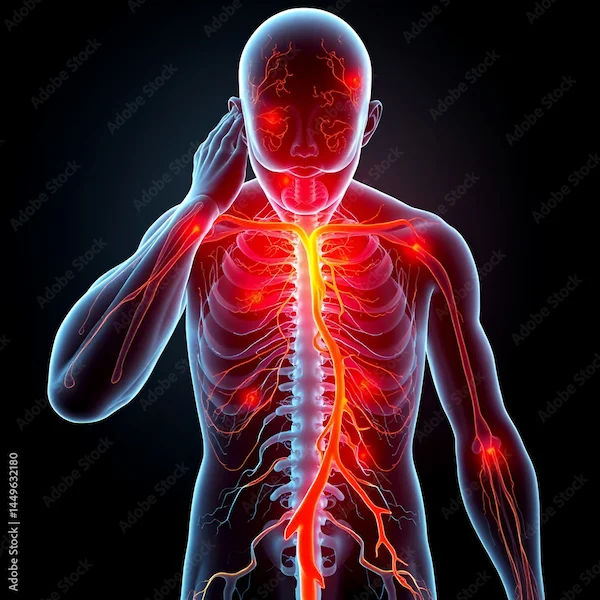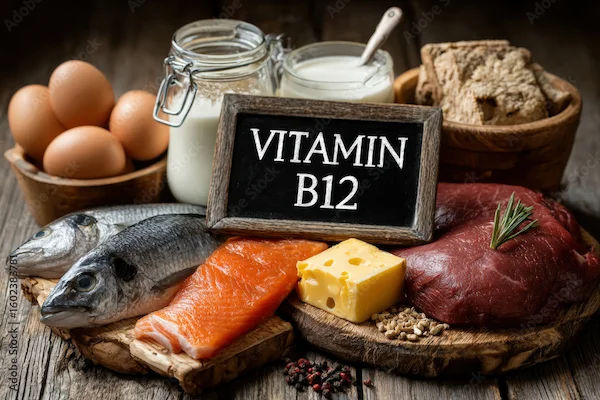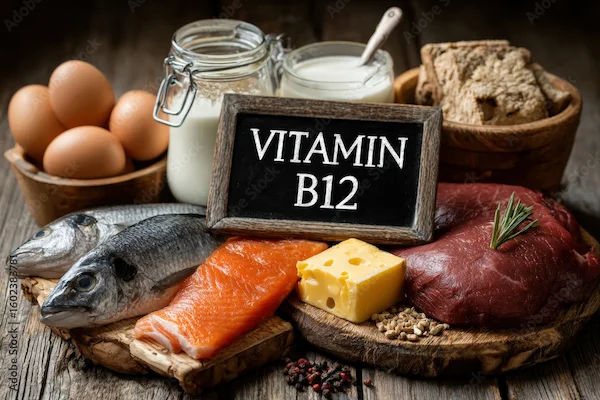Understanding Vitamin B12: Signs, Risks, and Prevention Tips
Learn why vitamin B12 is vital for your energy, nerves, and overall health. Discover deficiency symptoms, who is at risk, and how to maintain healthy levels.


Introduction
Vitamin B12 is a crucial nutrient that plays a vital role in keeping our bodies healthy. Despite its importance, many people are unaware of how essential it is or the problems that can arise if they don’t get enough of it. This article explains why vitamin B12 matters, how to recognise a deficiency, and practical ways to ensure you maintain healthy levels for better overall well-being.
What is Vitamin B12?
Vitamin B12, also known as cobalamin, is a water-soluble vitamin that our body needs for several key functions. It helps in:
Forming red blood cells – Prevents anaemia by ensuring proper oxygen transport.
Maintaining nerve function – Protects nerves and supports brain health.
Producing DNA – Essential for cell growth and repair.
Boosting energy levels – Helps convert food into usable energy.
Since our bodies cannot produce vitamin B12 on their own, we must get it from food or supplements.
Symptoms of Vitamin B12 Deficiency
A deficiency in vitamin B12 can lead to various health problems. Some common symptoms include:
Fatigue and weakness – Feeling tired even after adequate rest.
Numbness or tingling – Especially in hands and feet (a sign of nerve damage).
Memory problems or confusion – Difficulty concentrating or remembering things.
Mood changes – Increased irritability, anxiety, or depression.
Pale or yellowish skin – A sign of anaemia.
Balance issues – Difficulty walking steadily.
Sore tongue or mouth ulcers – Due to changes in mucous membranes.
If left untreated, a severe deficiency can lead to long-term nerve damage and cognitive decline.
Consult Top Specialists for Your Symptoms
Who is at Risk of Vitamin B12 Deficiency?
Certain groups of people are more likely to develop a deficiency:
1. Vegetarians and Vegans – Since vitamin B12 is mainly found in animal products, those who avoid meat, eggs, or dairy may not get enough.
2. Older Adults – Ageing reduces stomach acid, which is needed to absorb B12 from food.
3. People with Digestive Disorders – Conditions like Crohn’s disease, celiac disease, or gastric bypass surgery can affect absorption.
4. Long-term Medication Users – Some acid-reducing drugs (like PPIs) and diabetes medications can interfere with B12 absorption.
5. Pregnant and Breastfeeding Women – Higher B12 needs for fetal development and milk production.
How to Get Enough Vitamin B12
Getting enough vitamin B12 is easier than you might think if you know which foods to include and when supplements may be necessary.
1. Dietary Sources
The best natural sources of vitamin B12 include:
Animal-based foods: Meat (especially liver), fish (salmon, tuna), eggs, and dairy products (milk, cheese, yoghurt).
Fortified foods: Some plant-based milks, cereals, and nutritional yeast are enriched with B12.
If you follow a vegetarian or vegan diet, fortified foods or supplements may be necessary.
2. Supplements
Vitamin B12 supplements are available in different forms:
Oral tablets or capsules – Effective for most people.
Sublingual (under the tongue) tablets – Useful for those with absorption issues.
Injections – Recommended for severe deficiencies or absorption problems.
Always consult a doctor before starting supplements to determine the right dosage.
Managing and Preventing Deficiency
If you suspect a deficiency, a simple blood test can confirm your B12 levels. Here’s how you can manage and prevent it:
1. Eat a Balanced Diet – Include B12-rich foods regularly.
2. Consider Supplements if Needed – Especially if you’re at risk.
3. Monitor Symptoms – Early detection prevents complications.
4. Get Regular Check-ups – Especially if you have digestive issues or are over 50.
When to See a Doctor
If you experience persistent fatigue, nerve-related symptoms, or cognitive changes, consult a healthcare provider. A blood test can confirm if you have a deficiency, and your doctor can recommend the best treatment.
If you're concerned about your vitamin B12 levels, you can easily book a consultation or schedule a blood test through Apollo24|7. Early detection and treatment can help prevent serious health issues.
Final Thoughts
Vitamin B12 is essential for energy, nerve function, and overall well-being. While deficiency is common, it’s easily preventable with the right diet and supplements when necessary. Pay attention to your body, eat a balanced diet, and consult a doctor if you notice any symptoms.
Would you like to check your vitamin B12 levels? Visit Apollo24|7 for a quick and convenient test!
Consult Top Specialists for Your Symptoms
Consult Top Specialists for Your Symptoms

Dr. Rajib Ghose
General Practitioner
25 Years • MBBS
East Midnapore
VIVEKANANDA SEBA SADAN, East Midnapore

Dr. Chethan T L
General Physician/ Internal Medicine Specialist
5 Years • MBBS, MD, DNB (General Medicine)
Bengaluru
Apollo Medical Center, Marathahalli, Bengaluru

Dr Vinay Kumar A V
Nephrologist
8 Years • MBBS, MD - General Medicine, DM - Nephrology
Bilaspur
Apollo Hospitals Seepat Road, Bilaspur

Dr. Mohamed Azeem
General Physician/ Internal Medicine Specialist
2 Years • MBBS,MD(Internal Medicine) CCEBDM
Karaikudi
Apollo Hospitals Karaikudi, Karaikudi

Dr. Sandhya Chandel
General Physician/ Internal Medicine Specialist
16 Years • MBBS, MD (Int. Med.), IDCCM
Bilaspur
Apollo Hospitals Seepat Road, Bilaspur
(100+ Patients)




